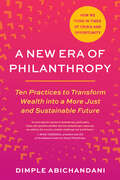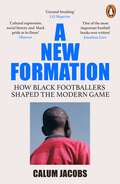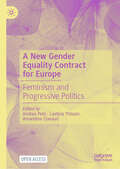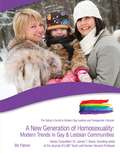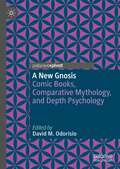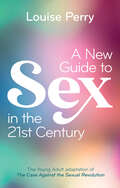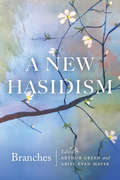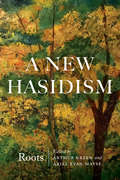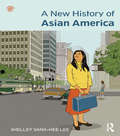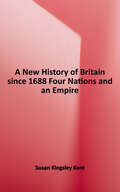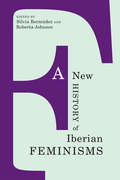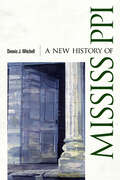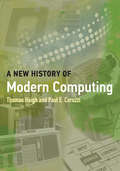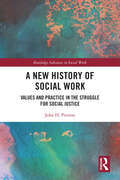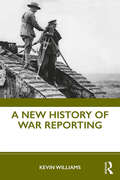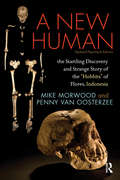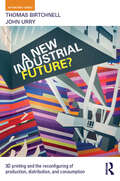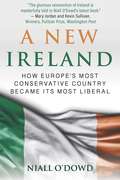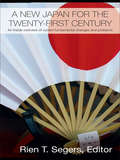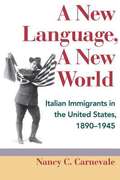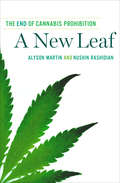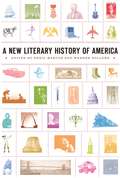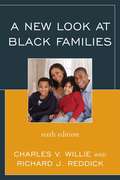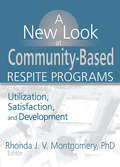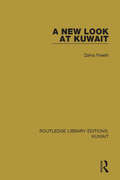- Table View
- List View
A New Era of Philanthropy: Ten Practices to Transform Wealth into a More Just and Sustainable Future-- How we fund in times of crisis and opportunity
by Dimple Abichandani&“A must-read for anyone in philanthropy, particularly those who question whether and how philanthropic resources can address the current, complex challenges our world faces.&” —Nick Tedesco, president and chief executive officer of the National Center for Family Philanthropy A blueprint for how wealth can be transformed into a more just and sustainable future in times of rapid change and crisis.On the cusp of the greatest wealth transfer in history—with $84 trillion dollars moving between generations in the next 20 years—this book explores how philanthropy can be transformative, and transformed.Can philanthropy be an anti-racist, feminist, relational, and joyful expression of solidarity?This book argues that it not only can be—for the future we seek, and for philanthropy to achieve its greatest impact, it must be.Nationally recognized philanthropic leader Dimple Abichandani revolutionizes the precepts of modern philanthropy. Offering 10 provocative practice shifts, A New Era of Philanthropy engages readers with fresh answers to the question of how philanthropy can meet this high-stakes moment—from reimagining governance to aligning investments to crisis funding and beyond.Abichandani highlights paradigm shifts that model the way forward, moving beyond critique into real transformation, with relatable stories about funders who are forging a new era of philanthropy.A New Era of Philanthropy picks up where key books like Decolonizing Wealth and Winners Take All leave off, offering a guide for donors, foundations, and non-profit leaders navigating philanthropy in urgent times. Clear-eyed, hopeful, and responsive to the moment, this book helps us reimagine the purpose and norms of modern philanthropy. It is an invitation to all of us who believe these resources can contribute to a more just future: start here.
A New Formation: How Black Footballers Shaped the Modern Game
by Calum JacobsA New Formation is an inventive and highly original analysis of the contributions that Black British footballers have made to Black British culture.Calum Jacobs and his co-contributors - including authors Musa Okwonga and Aniefiok Ekpoudom and sports broadcaster Jeanette Kwakye - eschew the standard frameworks of trauma and oppression that are foisted upon Black narratives. Instead, they draw upon broader social and cultural history to examine Black footballers in contexts larger than themselves. By engaging with the subtle connections between football and Black cultural expression, A New Formation reveals the vibrancy and nuance of contemporary Black life in Britain.Featuring interviews with Andy Cole, Ian Wright and Anita Asante.
A New Gender Equality Contract for Europe: Feminism and Progressive Politics
by Andrea Petö Laeticia Thissen Amandine ClavaudThis open access book, supported by FEPS and Fondation Jean-Jaurès, centres on the work of contemporary progressive feminist thinkers and the idea that there is no democracy without gender equality. The authors develop the concept of a feminism that works for everyone – regardless of their gender, social or cultural identity – in the context of EU policy. The book features gender experts with multidisciplinary backgrounds from across Europe, providing a comprehensive exploration of efforts to move away from “gender backlash” rhetoric and towards a new gender contract for a fairer, more equal European Union.
A New Generation of Homosexuality: Modern Trends in Gay & Lesbian Communities (The Gallup's Guide to Modern Gay, Lesbia)
by Bill PalmerYoung people "coming out" as lesbian, gay, bisexual, and transgender (LBGT) in the twenty-first century are being welcomed into a community that is proud, diverse, and vibrant! This book examines the history of the LGBT community in America from its roots in the free-thinking seaport cities of the 1800s, through the social revolution of World War II, the early activists of the 1950s, the "gay pride" movements of the 1970s, the AIDS crisis, and the mainstreaming of LGBT communities of the present day. It is a story of courage in the face of oppression, a demand for civil rights, and people making meaningful and authentic lives for themselves--and having fun, too. LGBT people today are the heirs of the hopes and dreams and hard work of past generations. This is an exciting and inspirational story of an American minority group that is still fighting for full acceptance in contemporary society.
A New Gnosis: Comic Books, Comparative Mythology, and Depth Psychology (Contemporary Religion and Popular Culture)
by David M. OdorisioSuperhero phenomena exploded into 20th- and 21st-century popular culture by way of the visual medium of comic books. In an increasingly secular (yet spiritual) culture that has largely renounced “the gods” (and even religion), what does the return of the superhero through our own pop cultural mythologies say to us—or even about us? This collection of essays from leading and up-and-coming scholars in the fields of comparative mythology and depth psychology considers the return of the superhero as representative of our own unique emergent modern mythology: a wildly diverse pantheon that reflects back to us our most far-reaching hopes and (im)possible (super)human desires. In placing the interpretive tools of comparative mythology and depth psychology alongside the comic book phenomenon, a super-powered palette emerges that unveils the hidden potential of modern readers’ own heightened imaginations. The essays in this anthology examine select comic book and superhero characters from the “Silver Age” 1960s through contemporary 21st-century adaptations and innovations, as readers are invited to discover and uncover what the (re)emergence of these perennial gods and goddesses have to say about our own secret super selves today.
A New Guide to Sex in the 21st Century: The Young Adult Adaptation of 'The Case Against the Sexual Revolution'
by Louise PerryThe bestselling feminist book, now adapted for a young adult audienceBefore the 1960s, sex before marriage was frowned upon and pornography was difficult to get hold of. We are now much freer to do what we like – there has been a ‘sexual revolution’. This must be a good thing, right?Wrong, argues Louise Perry. These changes have had many negative consequences, especially for girls and women. The main winners from a world of rough sex, hook-ups and freely available porn are a tiny minority of rich and powerful men. Women have been forced to adapt to these changes in ways that often harm them.Louise Perry carefully guides readers through the difficulties of sex in the 21st century. Her advice will be invaluable to all young women and men who may be feeling lost in a world where ‘doing it’ can sometimes seem dangerous or confusing.
A New Hasidism: Branches
by Arthur Green Ariel Evan MayseYou are invited to enter the new-old pathway of Neo-Hasidism—a movement that uplifts key elements of Hasidism’s Jewish revival of two centuries ago to reexamine the meaning of existence, see everything anew, and bring the world as it is and as it can be closer together. This volume brings this discussion into the twenty-first century, highlighting Neo-Hasidic approaches to key issues of our time. Eighteen contributions by leading Neo-Hasidic thinkers open with the credos of Zalman Schachter-Shalomi and Arthur Green. Or Rose wrestles with reinterpreting the rebbes’ harsh teachings concerning non-Jews. Ebn Leader assesses the perils of trusting one’s whole being to a single personality: can Neo-Hasidism endure as a living tradition without a rebbe? Shaul Magid candidly calibrates Shlomo Carlebach: how “the singing rabbi” transformed him and why Magid eventually walked away. Other contributors engage questions such as: How might women enter this hitherto gendered sphere created by and for men? How can we honor and draw nourishment from other religions’ teachings? Can the rebbes’ radiant wisdom guide those who struggle with self-diminishment to reclaim wholeness? Together these intellectually honest and spiritually robust conversations inspire us to grapple anew with Judaism’s legacy and future.
A New Hasidism: Roots
by Arthur Green Ariel Evan MayseNeo-Hasidism applies the Hasidic masters’ spiritual insights—of God’s presence everywhere, of seeking the magnificent within the everyday, in doing all things with love and joy, uplifting all of life to become a vehicle of God’s service—to contemporary Judaism, as practiced by men and women who do not live within the strictly bounded world of the Hasidic community. This first-ever anthology of Neo-Hasidic philosophy brings together the writings of its progenitors: five great twentieth-century European and American Jewish thinkers—Hillel Zeitlin, Martin Buber, Abraham Joshua Heschel, Shlomo Carlebach, and Zalman Schachter-Shalomi—plus a young Arthur Green. The thinkers reflect on the inner life of the individual and their dreams of creating a Neo-Hasidic spiritual community. The editors’ introductions and notes analyze each thinker’s contributions to Neo-Hasidic thought and influence on the movement. Zeitlin and Buber initiated a renewal of Hasidism for the modern world; Heschel’s work is quietly infused with Neo-Hasidic thought; Carlebach and Schachter-Shalomi re-created Neo-Hasidism for American Jews in the 1960s; and Green is the first American-born Jewish thinker fully identified with the movement. Previously unpublished materials by Carlebach and Schachter-Shalomi include an interview with Schachter-Shalomi about his decision to leave Chabad-Lubavitch and embark on his own Neo-Hasidic path.
A New History of Asian America
by Shelley Sang-Hee LeeA New History of Asian America is a fresh and up-to-date history of Asians in the United States from the late eighteenth century to the present. Drawing on current scholarship, Shelley Lee brings forward the many strands of Asian American history, highlighting the distinctive nature of the Asian American experience while placing the narrative in the context of the major trajectories and turning points of U.S. history. Covering the history of Filipinos, Koreans, Asian Indians, and Southeast Indians as well as Chinese and Japanese, the book gives full attention to the diversity within Asian America. A robust companion website features additional resources for students, including primary documents, a timeline, links, videos, and an image gallery. From the building of the transcontinental railroad to the celebrity of Jeremy Lin, people of Asian descent have been involved in and affected by the history of America. A New History of Asian America gives twenty-first-century students a clear, comprehensive, and contemporary introduction to this vital history.
A New History of Britain Since 1688: Four Nations and an Empire
by Susan Kingsley Kent"Based on the most current scholarship concerning gender, race, ethnicity, and empire, this 15-chapter textbook comprehensively examines the development ot and contestations against a British identity among the constituent parts of the United Kingdom since 1688. It takes seriously the role of Scotland, Wales, and Ireland in this process, and brings Britain's imperial subjects and lands into the narrative, showing how integral empire was to the UK's historical development. It examines the role environmental factors in economic development and their impact on the health and welfare of British citizens and subjects; and it uses gender, in particular, to illuminate power dynamics across a variety of settings. All this in a manageable length"--Provided by publisher.
A New History of Iberian Feminisms (Toronto Iberic)
by Silvia Bermudez Roberta JohnsonA New History of Iberian Feminisms is both a chronological history and an analytical discussion of feminist thought in the Iberian Peninsula, including Portugal, and the territories of Spain – the Basque Provinces, Catalonia, and Galicia – from the eighteenth century to the present day. The Iberian Peninsula encompasses a dynamic and fraught history of feminism that had to contend with entrenched tradition and a dominant Catholic Church. Editors Silvia Bermúdez and Roberta Johnson and their contributors reveal the long and historical struggles of women living within various parts of the Iberian Peninsula to achieve full citizenship. A New History of Iberian Feminisms comprises a great deal of new scholarship, including nineteenth-century essays written by women on the topic of equality. By addressing these lost texts of feminist thought, Bermúdez, Johnson, and their contributors reveal that female equality, considered a dormant topic in the early nineteenth century, was very much part of the political conversation, and helped to launch the new feminist wave in the second half of the century.
A New History of Mississippi
by Dennis J. MitchellCreating the first comprehensive narrative of Mississippi since the bicentennial history was published in 1976, Dennis J. Mitchell recounts the vibrant and turbulent history of a Deep South state. The author has condensed the massive scholarship produced since that time into an appealing narrative, which incorporates people missing from many previous histories including American Indians, women, African Americans, and a diversity of other minority groups. This is the story of a place and its people, history makers and ordinary citizens alike. Mississippi's rich flora and fauna are also central to the story, which follows both natural and man-made destruction and the major efforts to restore and defend rare untouched areas. Hernando De Soto, Sieur d’Iberville, Ferdinand Claiborne, Thomas Hinds, Aaron Burr, Greenwood LeFlore, Joseph Davis, Nathan Bedford Forrest, James D. Lynch, James K. Vardaman, Mary Grace Quackenbos, Ida B. Wells, William Alexander Percy, William Faulkner, Eudora Welty, Muddy Waters, B.B. King, Elvis Presley, John Grisham, Jack Reed, William F. Winter, Jim Barksdale, Richard Howorth, Christopher Epps, and too many more to list—this book covers a vast and rich legacy. From the rise and fall of American Indian culture to the advent of Mississippi’s world-renowned literary, artistic, and scientific contributions, Mitchell vividly brings to life the individuals and institutions that have created a fascinating and diverse state.
A New History of Modern Computing (History of Computing)
by Paul E. Ceruzzi Thomas HaighHow the computer became universal.Over the past fifty years, the computer has been transformed from a hulking scientific supertool and data processing workhorse, remote from the experiences of ordinary people, to a diverse family of devices that billions rely on to play games, shop, stream music and movies, communicate, and count their steps. In A New History of Modern Computing, Thomas Haigh and Paul Ceruzzi trace these changes. A comprehensive reimagining of Ceruzzi's A History of Modern Computing, this new volume uses each chapter to recount one such transformation, describing how a particular community of users and producers remade the computer into something new. Haigh and Ceruzzi ground their accounts of these computing revolutions in the longer and deeper history of computing technology. They begin with the story of the 1945 ENIAC computer, which introduced the vocabulary of "programs" and "programming," and proceed through email, pocket calculators, personal computers, the World Wide Web, videogames, smart phones, and our current world of computers everywhere--in phones, cars, appliances, watches, and more. Finally, they consider the Tesla Model S as an object that simultaneously embodies many strands of computing.
A New History of Social Work: Values and Practice in the Struggle for Social Justice (Routledge Advances in Social Work)
by John H. PiersonThis book provides an overview of the main developments in social work over its 200-year history. From its beginnings in the early 19th century through to the present day, it recounts the efforts to create a fairer, socially just society through its work with individuals and families. Throughout, by focusing on individual cases as well as major ideas behind practice, this book invites the reader to step into the practitioner’s world as it unfolded. Providing a fresh, critical history of social work in Britain, the book covers the practical assistance for families and individuals in poverty in the 19th century; women’s social work with destitute mothers and children; social work’s response to war time needs; the development of specific domains of social work such as hospital social work, psychiatric social workers, moral welfare and children in care; tackling racism; and social work in a market society. The reader encounters the society that social workers and their users wrote about, thought about and sought to create. Covering critical points of dispute along with overarching visions that would take the profession – and society – forward, the book explores the ideologies, moral constructs and social forces that shaped everyday social work. A New History of Social Work will be of interest to all scholars and students of social work and will be particularly relevant for modules on introductions to social work and the foundations of social work.
A New History of War Reporting
by Kevin WilliamsThis book takes a fresh look at the history of war reporting to understand how new technology, new ways of waging war and new media conditions are changing the role and work of today’s war correspondent. Focussing on the mechanics of war reporting and the logistical and institutional pressures on correspondents, the book further examines the role of war propaganda, accreditation and news management in shaping the evolution of the specialism. Previously neglected conflicts and correspondents are reclaimed and wars considered as key moments in the history of war reporting such as the Crimean War (1854-56) and the Great War (1914-18) are re-evaluated. The use of objectivity as the yardstick by which to assess the performance of war correspondents is questioned. The emphasis is instead placed on war as a messy business which confronts reporters and photographers with conditions that challenge the norms of professional practice. References to the ‘demise of the war correspondent’ have accompanied the growth of the specialism since the days of William Howard Russell, the so-called father of war reporting. This highlights the fragile nature of this sub-genre of journalism and emphasises that continuity as much as change characterises the work of the war correspondent. A thematically organised, historically rich introduction, this book is ideal for students of journalism, media and communication.
A New Human: The Startling Discovery and Strange Story of the "Hobbits" of Flores, Indonesia, Updated Paperback Edition
by Mike Morwood Penny Van OosterzeeIn the most revolutionary archaeological find of the new century, an international team of archaeologists led by Mike Morwood discovered a new, diminutive species of human on the remote Indonesian island of Flores. Nicknamed the "Hobbit," this was no creation of Tolkien's fantasy. The three foot tall skeleton with a brain the size of a chimpanzee's was a tool-using, fire-making, cooperatively hunting person who inhabited Flores alongside modern humans as recently as 13,000 years ago. This book is Morwood's description of this monumental discovery and the intense study that has been undertaken to validate his view of its relationship to our species. He chronicles the bitter debates over Homo Floresiensis, the objections (some spiteful) of colleagues, the theft and damage of some of the specimens, and the endless battle against government and academic bureaucracies that hindered his research. This updated paperback edition contains an epilogue that reports on the most recent debates, findings, and analyses of this amazing discovery.
A New Industrial Future?: 3D Printing and the Reconfiguring of Production, Distribution, and Consumption (Antinomies)
by John Urry Thomas BirtchnellA New Industrial Future? examines whether a further industrial revolution is taking place around the world. In this compelling book Birtchnell and Urry examine such a new possible future involving the mass adoption of 3D printing. The locating of 3D printers in homes, offices, stores and workshops would disrupt existing systems and pose novel challenges for incumbents. The book drawing upon expert interviews, scenario workshops and various case studies assesses the potential future of global manufacturing, freight transport, world trade and land use. It offers the first book-length social scientific analysis of the character and impacts of a new system of manufacturing that is in formation. The book will be of interest to urban planners, policy makers, social scientists, futurologists, economists, as well as general readers by offering inquiry on this future upheaval in the means of production.
A New Ireland: How Europe's Most Conservative Country Became Its Most Liberal
by Niall O'DowdIn a May 2019 countrywide referendum, Ireland voted overwhelmingly to make abortion legal; three years earlier, it had done the same with same-sex marriage, becoming the only country in the world to pass such a law by universal suffrage. Pope Francis’s visit to the country saw protests and a fraction of the emphatic welcome that Pope John Paul’s had seen forty years earlier. There have been two female heads of state since 1990, the first two in Ireland’s history. Prime Minister Leo Varadkar, an openly gay man of Indian heritage, declared that “a quiet revolution had taken place.” <p> It had. For nearly all of its modern history, Ireland was Europe’s most conservative country. The Catholic Church was its most powerful institution and held power over all facets of Irish life. <p> But as scandal eroded the Church’s hold on Irish life, a new Ireland has flourished. War in the North has ended. EU membership and an influx of American multinational corporations have helped Ireland weather economic depression and transform into Europe’s headquarters for Apple, Facebook, and Google. <p> With help from prominent Irish and Irish American voices like historian and bestselling author Tim Pat Coogan and the New York Times’s Maureen Dowd, A New Ireland tells the story of a modern revolution against all odds.
A New Japan for the Twenty-First Century: An Inside Overview of Current Fundamental Changes and Problems (Routledge Contemporary Japan Series)
by Rien T. SegersMany people in the West portray Japan as being fixed in its ways, and unable to change, and consequently risking national decline and international loss of prestige. However, in fact, Japan is at present in a significant transition period, comparable to the Meiji Restoration of 1868 or the period immediately after the Second World War. This transition period comes with a mixture of events and situations which are difficult to interpret both for foreign as well as domestic commentators and decision makers. In this book a range of senior experts from inside Japan outline the many considerable changes currently taking place in a wide range of fields, including the economy, business and technology, politics, governance and international relations, and a wide range of social issues - the media, the position of women, nationalism and national consciousness, and religion. Overall, the book provides a corrective to misplaced Western and Eastern views; it aims to redirect stereotyped thinking about contemporary Japan both inside as well as outside the country. In addition it gives a summary overview of contemporary Japan, its current changes and problems– in short the inside story of the second strongest national economy in the world which is in the process of fundamental re-engineering and which will continue to have a huge impact globally going forward.
A New Language, A New World: Italian Immigrants in the United States, 1890-1945
by Nancy C. CarnevaleAn examination of Italian immigrants and their children in the early twentieth century, A New Language, A New World is the first full-length historical case study of one immigrant group's experience with language in America. Incorporating the interdisciplinary literature on language within a historical framework, Nancy C. Carnevale illustrates the complexity of the topic of language in American immigrant life. By looking at language from the perspectives of both immigrants and the dominant culture as well as their interaction, this book reveals the role of language in the formation of ethnic identity and the often coercive context within which immigrants must negotiate this process.
A New Leaf: The End of Cannabis Prohibition
by Nushin Rashidian Alyson MartinTwo award-winning journalists offer a &“cogent, well-sourced and ambitious analysis of the slow decline of cannabis prohibition in the United States&” (Kirkus Reviews). In November 2012, voters in Colorado and Washington passed landmark measures to legalize the production and sale of cannabis for social use—a first in the United States and the world. Once vilified as a &“gateway drug,&” cannabis is now legal for medical use in eighteen states and Washington, DC. Yet the federal government refuses to acknowledge these broader societal shifts. 49.5 percent of all drug-related arrests involve the sale, manufacture, or possession of cannabis. In the first book to explore the new landscape of cannabis in the United States, investigative journalists Alyson Martin and Nushin Rashidian demonstrate how recent cultural and legal developments tie into cannabis&’s complex history and thorny politics. Reporting from nearly every state with a medical cannabis law, Martin and Rashidian interview patients, growers, doctors, entrepreneurs, politicians, activists, and regulators. A New Leaf moves from the federal cannabis farm at the University of Mississippi to the headquarters of the ACLU to Oregon&’s World Famous Cannabis Café. The result is a lucid account of how cannabis legalization is changing the lives of millions of Americans and easing the burden of the &“war on drugs&” both domestically and internationally.
A New Literary History of America (Harvard University Press Reference Library)
by Werner Sollors Greil MarcusAmerica is a nation making itself up as it goes along—a story of discovery and invention unfolding in speeches and images, letters and poetry, unprecedented feats of scholarship and imagination. In these myriad, multiform, endlessly changing expressions of the American experience, the authors and editors of this volume find a new American history.In more than two hundred original essays, A New Literary History of America brings together the nation’s many voices. From the first conception of a New World in the sixteenth century to the latest re-envisioning of that world in cartoons, television, science fiction, and hip hop, the book gives us a new, kaleidoscopic view of what “Made in America” means. Literature, music, film, art, history, science, philosophy, political rhetoric—cultural creations of every kind appear in relation to each other, and to the time and place that give them shape.The meeting of minds is extraordinary as T. J. Clark writes on Jackson Pollock, Paul Muldoon on Carl Sandburg, Camille Paglia on Tennessee Williams, Sarah Vowell on Grant Wood’s American Gothic, Walter Mosley on hard-boiled detective fiction, Jonathan Lethem on Thomas Edison, Gerald Early on Tarzan, Bharati Mukherjee on The Scarlet Letter, Gish Jen on Catcher in the Rye, and Ishmael Reed on Huckleberry Finn. From Anne Bradstreet and John Winthrop to Philip Roth and Toni Morrison, from Alexander Graham Bell and Stephen Foster to Alcoholics Anonymous, Life, Chuck Berry, Alfred Hitchcock, and Ronald Reagan, this is America singing, celebrating itself, and becoming something altogether different, plural, singular, new.
A New Look at Black Families
by Charles Vert Willie Richard ReddickCharles Willie and Richard Reddick's A New Look at Black Families has introduced thousands of students to the intricacies of the Black family in American society since its publication in 1976. Using a case study approach, Willie and Reddick show the varieties of the Black family experience and how those experiences vary by socioeconomic status. In addition to examining families of low-income, working, and middle classes, the authors also look to the family experiences of highly successful African Americans to try to identify the elements of the family environment leading to success. The authors puncture the myth of the Black matriarchy prevalent in the popular imagination; and they explore a variety of family configurations, including a family with same-gender parents. The sixth edition has been reorganized and updated throughout. The new Part III Cases Against and for Black Men and Women unites two chapters from previous editions into a cohesive discussion of stereotypes and misunderstandings from both scholars and the mass media. Also, a new chapter on the Obama family offers support for cross-gender and cross-racial mentoring, and it demonstrates the value of extended family relations.
A New Look at Community-Based Respite Programs: Utilization, Satisfaction, and Development
by Rhonda J.V. MontgomeryExplore new frontiers in Alzheimer's support systems! When Congress authorized the Alzheimer's Disease Demonstration Grants to States program in 1990, no one knew how effective the program would prove to be. A New Look at Community-Based Respite Programs provides you with results of the first major evaluation of ADDGS programs. Across the country, groups were able to develop specialized programs that reached traditionally underserved clients. A byproduct of many of the ADDGS programs was that they helped strengthen ties between communities and agencies, improving social services for both caregivers and people with Alzheimer's. A New Look at Community-Based Respite Programs examines: the profile of the average respite care user different challenges faced by urban and rural clientele how culture and ethnicity influence health care decisions ways to involve communities in respite care how understanding patterns of use makes for better program design and implementation A New Look at Community-Based Respite Programs provides you with detailed analyses of a variety of successful support service plans, including mobile day care, Latino-specific outreach, traveling dementia evaluation teams, and programs designed for people who live alone. You'll also read about the importance of complementing family caregivers instead of substituting for them. Throughout, helpful tables make the results of ADDGS programs clear. It is estimated that Alzheimer's will affect up to 14 million Americans by the year 2050. A New Look at Community-Based Respite Programs contains vital knowledge that you can act on now to help lay the foundations for a better future.
A New Look at Kuwait (Routledge Library Editions: Kuwait #1)
by Zahra FreethThis book, first published in 1972, describes a Kuwait normally hidden to the eyes of visitors. The author draws upon a vast experience of the country, from both before and after the discovery of oil, and analyses the changes to the physical appearance of the city as well as the changes to the customs and outlook of its people.
